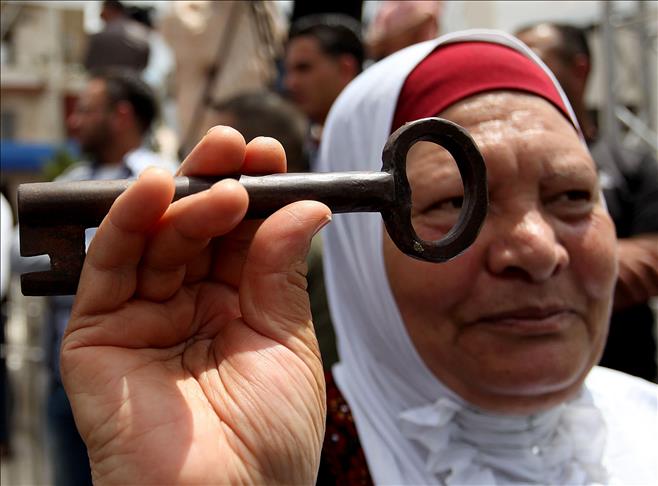
RAMALLAH, Palestine
The Palestinian Nakba – which refers to the mass expulsion of Palestinians upon the establishment of Israel in 1948 – has been the subject of many movies, the themes of which range from resistance and the Palestinian diaspora to a longing for one's ancestral homeland.
"The first phase [of Palestinian cinema, from 1968 to 1974] was colored by the revolutionary spirit," Palestinian film critic Bashar Ibrahim told Anadolu Agency, explaining the development of Palestinian cinema since the 1948 Nakba, which is Arabic for "catastrophe."
According to Ibrahim, Palestinian movies during this phase voiced a rejection of peace with Israel and focused on the situation in the refugee camps as incubators of Palestinian armed resistance.
Peace prospects, nostalgia
Films of the following phase, from 1974 to 1980, Ibrahim said, expressed a possible acceptance of a peaceful solution to the conflict. These films also portrayed the Nakba as the main reason for the plight of Palestinian refugees across the region.
"Most of these movies were produced in Beirut. Palestinian producers had to hire foreigners to be able to have material filmed inside the West Bank and Gaza Strip," he said.
According to Ibrahim, Palestinians in the Gaza Strip and the West Bank started the third phase of Palestinian cinema by producing movies from the occupied territories.
These films tackled themes such as nostalgia for lost homes and land and the daily hardships caused by Israel's occupation.
For example, the Palestinian critic said, when the First Intifada erupted in 1987, Palestinian filmmakers portrayed the main causes of the uprising in a series of films inspired by stone-throwing Palestinian children, working women, refugees, prisoners and Palestinians killed at the hands of Israeli troops.
Reviving Nakba's memory
After 1997, Palestinian filmmaking focused on reviving the memories, implications and impact of the 1948 Nakba, Ibrahim said.
"The history of Palestinian film took another turn when the Second Intifada erupted in 2000, when the main theme of Palestinian movies became 'martyrdom [suicide] operations [against Israel],'" Ibrahim explained.
"Questions as to the legitimacy of these attacks and the suffering of Palestinians caused by Israeli checkpoints, raids, crimes and the [West Bank] separation wall dominated the plots of several movies at this time," he added.
Ibrahim cited "The Time that Remains" (2009), directed by Elia Suleiman, as an example of a Palestinian movie that won international acclaim as well as many film awards.
"The film portrays a Palestinian refugee who returns to his homeland to live out what remains of his life," Ibrahim said. "It includes memories – flashbacks – of a Palestinian family, from the Nakba through 1970 until the present."
Another film was 2013's "My Love Awaits Me by the Sea," a fantasy that portrays a Palestinian woman who searches – with her imaginary lover – for peace, love and enlightenment.
"Director Mais Darwazah insisted on screening her movie in the West Bank and Israel to show the suffering of West Bank Palestinians who were cut off from the Mediterranean Sea as a result of the creation of Israel," Ibrahim said.
The latest film of this category, Ibrahim said, was "The Red Stone," released last year by Palestinian director Ahmad Damen.
"The film focuses on Jerusalem by portraying the lives of four [Palestinian] Jerusalemite families and how their dreams and homes were stolen by the Israeli occupation," he said.
The 'new generation'
Ibrahim noted that the three aforementioned directors were part of what is described as the "new generation" of Palestinian filmmakers.
They portray the Palestinian struggle with a "realistic, feet-on-the ground approach," while reminding the audience about the Nakba and how that event profoundly impacted an entire people.
The Israel-Palestine conflict began in 1917 when the British government, in the now-famous "Balfour Declaration," called for "the establishment in Palestine of a national home for the Jewish people."
In 1948, a newly-formed state inside historical Palestine – "Israel" – was established.
The Palestinian diaspora has since become one of the largest in the world. Palestinian refugees are now spread across Jordan, Lebanon, Syria and other countries, while many have settled in refugee camps in the Palestinian West Bank and Gaza Strip.
For many Palestinians, the right to return to their homes in historical Palestine remains a key demand.
Anadolu Agency website contains only a portion of the news stories offered to subscribers in the AA News Broadcasting System (HAS), and in summarized form. Please contact us for subscription options.







